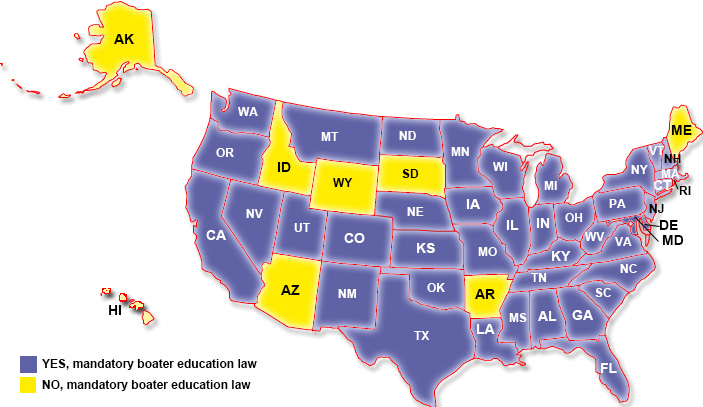Boating Laws & License Requirements by State
Passing a boating safety course will give you a discount on boat insurance and will increase your
water safety skills. Boat safety courses are an excellent investment of time and money, regardless
of your state's boating law. Each state has unique boating education requirements, and the boating
rules, laws and regulations vary from state to state for obtaining a boat license or safety certification.
Be sure to review the full legal requirements for your particular state.

|
 |
Connecticut |
| |
Connecticut Department of Environmental Protection |
| |
To legally operate any boat with an engine or motor, other than a personal watercraft, or a sailboat 19 1/2 feet in length or longer, the following persons must obtain a 'Safe Boating Certificate' or a 'Certificate of Personal Watercraft Operation'.
Residents of Connecticut:
• Owners of real property in Connecticut
• Anyone using Connecticut waters more than 60 days in a year
A person who has a valid vessel operator license by the United States Coast Guard does not require a 'Safe Boating Certificate'. They must have a copy of the license on board the recreational vessel on which they are operating.
To legally operate of a personal watercraft, regardless of state residency, you must possess a 'Certificate of Personal Watercraft Operation' to operate on Connecticut waters.
The Connecticut 'Safe Boating Certificate' and 'Certificate of Personal Watercraft Operation' are accepted in many states. Connecticut recognizes certificates from New York, Massachusetts and Rhode Island for use upon our waters.
|
| |
Click here to access the Connecticut State Boating Guide (9MB; pdf format) |
States with mandatory boating law require safety certification for some or all boaters. Only one state (Alabama) requires an actual boat license. However, many prospective students are not aware of state legal terminology, and search for information about a boat license or licence, or a captain or captains license. This page is an excellent resource for boating law for all fifty states.
|



